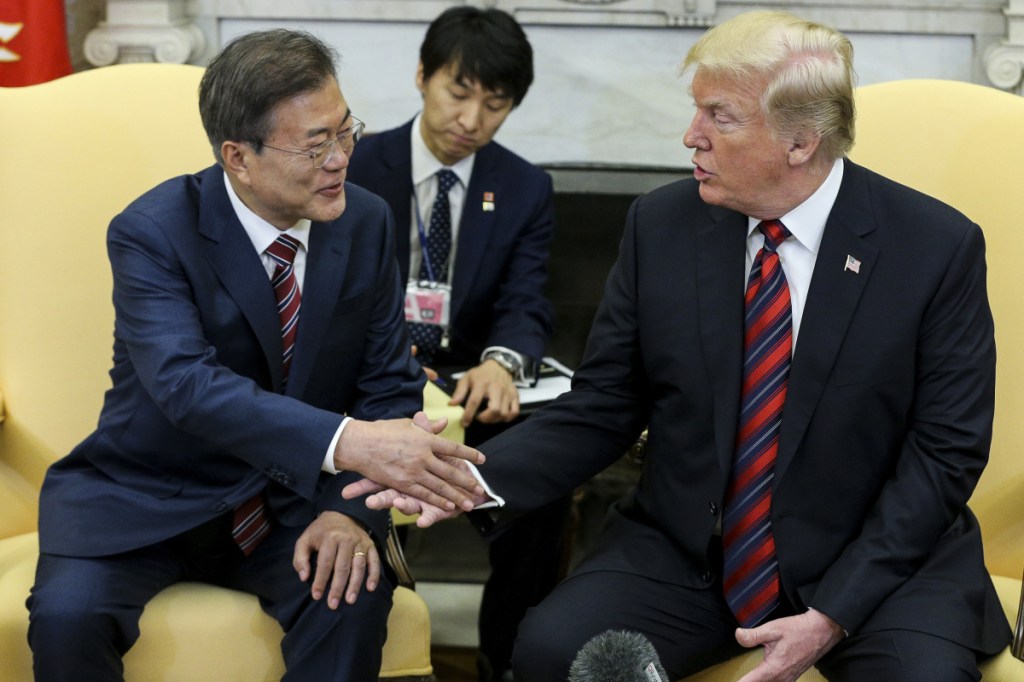The trade pact that the Trump administration renegotiated with South Korea this year is in jeopardy as the U.S. considers imposing tariffs on auto imports.
While the two sides agreed in March on a revised Korea-U.S. free trade agreement, known as Korus, they still haven’t signed it into law. And the parliament in Seoul won’t be able to ratify the deal if the U.S. slaps new tariffs on Korean car imports on national security grounds, according to the ruling Democratic Party’s Hong Young-pyo.
It would be “highly irrational” of the U.S. to impose such tariffs after Korea met most of the U.S. demands on cars during the renegotiation, said Hong, the party’s leader on the floor of the National Assembly. “This would make it hard for parliament to ratify the deal,” Hong said.
His view is echoed by opposition and minor parties, as well as editorials in local newspapers, as Korean and global automakers await a report on the U.S. investigation into auto imports that is due by February. America’s other trading partners are closely watching the developments, with any move that undermines Korus likely to discourage them from entering bilateral talks.
BENEFITS FOR U.S. UNDER DEAL
Under the revised Korus deal, Seoul had agreed to double to 50,000 the number of cars that each U.S. automaker can sell in Korea without meeting local safety standards, senior Trump administration officials told reporters in March. The two sides also agreed the U.S. wouldn’t reimpose tariffs on Korean car exports, though America did extend its 25 percent levy on pickup-truck imports until 2041, from 2021 previously.
Cars from Korea, which currently face no U.S. tariffs, were the biggest source of the nation’s $18 billion trade surplus with the U.S. last year, according to the Korea International Trade Association. The imbalance was one reason why the U.S. demanded that Seoul lower non-tariff barriers to imports of U.S. vehicles in the revised agreement.
In May, Trump ordered U.S. officials to investigate global auto imports for potential trade penalties, including higher tariffs, on national security grounds, using the same 1960s trade law that he employed to justify steel and aluminum tariffs. The investigation appeared to put carmakers around the world in the administration’s sights, including South Korea, although Trump in July agreed to suspend the threat against the European Union.
Thomas Byrne, president of the Korea Society in New York and formerly a senior vice president at Moody’s Investors Service, said at a seminar in Seoul this month that the U.S. is unlikely to slap tariffs on Korean cars.
Invoking national security to impose tariffs would damage the bilateral trade relationship and possibly the security relationship as well, Byrne said.
Wendy Cutler, who was the chief U.S. negotiator for the original Korea agreement, said she also expects Seoul to receive an exemption from auto tariffs. Cutler said Korea’s concessions in the talks were largely focused on autos. The deal is an accomplishment for the Trump administration, and the outcome of the process will affect how other countries consider entering into trade negotiations with the U.S., she said.
making other nations skittish
Yet uncertainty is sowing seeds of discord in Seoul and beyond.
Trade Minister Kim Hyun-chong pressed South Korea’s case with White House officials and members of Congress during a trip to the U.S. last month. Finance Minister Kim Dong-yeon did the same with Treasury Secretary Steven Mnuchin during a Group of 20 meeting in Argentina.
“If these are the rewards for engaging in a trade process with the United States, many countries seem to be opting to not step forward,” said Eric Miller, a former Canadian diplomat who is now a Washington-based trade consultant with Rideau Potomac Strategy Group.
Send questions/comments to the editors.



Success. Please wait for the page to reload. If the page does not reload within 5 seconds, please refresh the page.
Enter your email and password to access comments.
Hi, to comment on stories you must . This profile is in addition to your subscription and website login.
Already have a commenting profile? .
Invalid username/password.
Please check your email to confirm and complete your registration.
Only subscribers are eligible to post comments. Please subscribe or login first for digital access. Here’s why.
Use the form below to reset your password. When you've submitted your account email, we will send an email with a reset code.